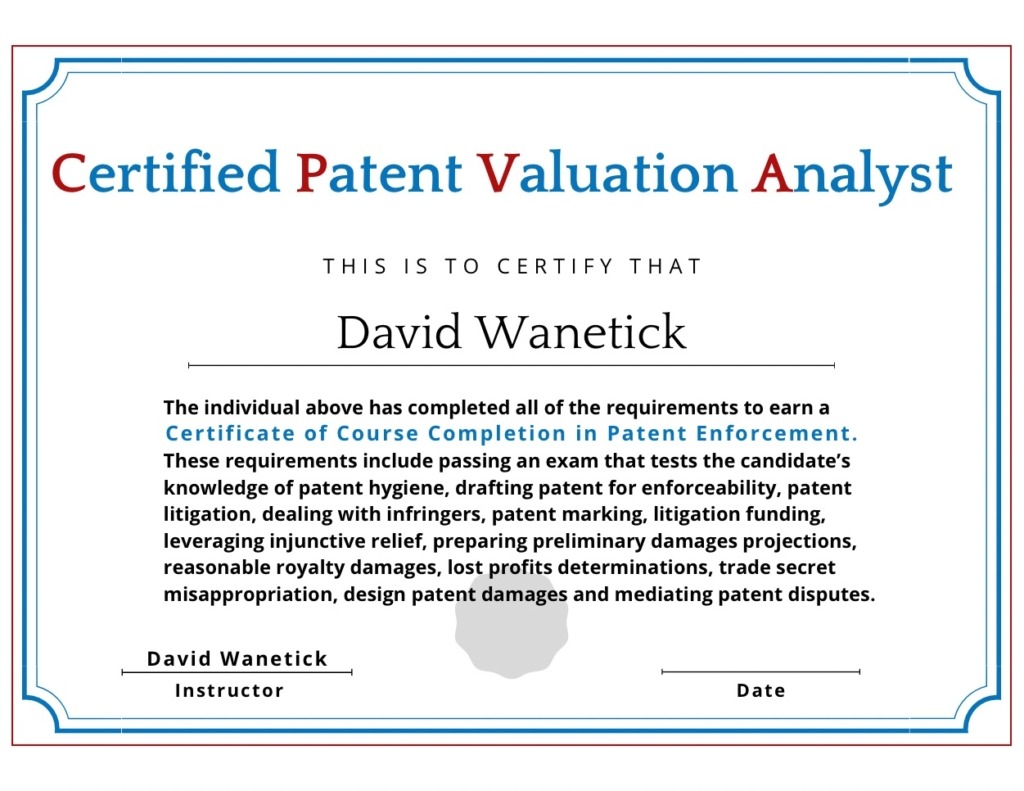Maximizing Returns on Patent Enforcement
A Two-Day Virtual Summit
May 28 - 29, 2025
9:00 am - 4:30 pm EST
View The Faculty
Registration
The Road to Receiving Patent Damages Awards is Tortuous
Novices Should Not Attempt to Navigate it Alone
Al Capone said, “You can go a long way with a smile.
You can go a lot farther with a smile and a gun.”
So too is the case with monetizing patents. In the world of patents, the path to money is much shorter and certain via assertion than by way of friendly licensing. In fact, patent brokers rarely take on clients if assertion isn’t in the cards.
You fool with the bull. You get the horns.
Overzealous patentees that mistake large operating companies for ATMs or pinatas do so at the risk of vicious retaliation.
What You Will Learn
- Impact of liens and licenses on litigation
- Drafting patents for attack from infringers
- Benefits of selling versus asserting patents
- Importance of patent marking
- Roadmap of the patent litigation process
- Contingency fee arrangements
- Leveraging injunctions
- Determining reasonable royalty awards
- Developments in lost profits
- Determining design patent damages
- Elements of trade secret damages
- Arbitrating trade secret disputes
- Apportionment issues
- Treble damages
Who Should Attend
- Patentees
- Patent Litigators
- Damages Experts
- Litigation Funders
- Patent Brokers
- Intellectual Property Licensing Professionals
- Inventors
- IP Asset Managers
- Corporate Intellectual Property Attorneys
- Research Directors
- Business Development Professionals
- Investors
- CEOs, CFOs, Boards of Directors
- Business Leaders
Who Has Attended CPVA Sessions
- British Telecom
- DuPont
- Fujitsu
- Philip Morris
- Exxon
- Oracle
- Pfizer
- Stryker
- Cisco
- Ford Motors
- Microsoft
- Lockheed Martin
- General Electric
- McKesson
How much money can patentees expect to receive when they assert their patents?
Code Compliance
and Precedence Adherence
It would seem that calculating damages awards is easy. After all, most damages awards are a function of past infringement and the past is knowable, right?
And the governing code states that the minimum damages that patentees are entitled to is reasonable royalties, which is the just product of reasonable royalty rates and the royalty base. Sounds simple, right?
Revenue and Royalty Rate Determinations
Nothing could be further from the truth. Calculating damages resulting from patent infringement and trade secret misappropriation is amazingly complex. How much revenue does a product generate? Not so easy to answer given that some products are bundled together, discounts are offered sporadically, prices vacillate based on volumes purchased, and currencies must be converted. And revenues generated by products are probably the easiest part of damages calculations.
Royalty Base and Apportionment
What royalty rates should be used? Given that patents must cover unique inventions and few licensing deals are disclosed, it isn’t easy to determine where comparable royalty rates lie. What about the royalty base? When should the entire product be used as the base and when should the smallest saleable unit be used as the royalty base? How should apportionment be determined? And once apportionment has been applied to the royalty base, do you need to adjust your royalty rates?
About the Certified Patent Valuation Analyst Designation
The Certified Patent Valuation Analyst is recognized as the world-wide leader in patent valuation training. CPVA programs have been presented all over the globe for more than 15 years. Leading patent professionals have attended our training in over a dozen cities in the United States as well as in Canada, the United Kingdom, France, Germany, Spain, Belgium, the Netherlands, Denmark, Israel, Dubai, Malaysia, China, India, Hong Kong, Singapore, Thailand and the Philippines. Visit our site to review hundreds of testimonials and our CPVA designee directory.
May 28, 2025 – Day 1
Event Schedule At-A-Glance
MORNING / EARLY AFTERNOON
9:50 am EST – Opening Remarks
10:00 am EST – The Importance of Preemptive Patent Hygiene on Patent Assertion
10:30 am EST – Drafting and Prosecuting Patents for Enforceability
11:15 am EST – The Patent Litigation Process
12:00 pm EST – Coffee Break
12:15 pm EST – Advanced Patent Litigation Strategies
AFTERNOON
1:00 pm EST – Cross-Border Litigation Strategies Using Europe’s Unified Patent Court
2:00 pm EST – Lunch Break
2:30 pm EST – Working with Contingency Lawyers and Litigation Finance Companies
3:15 pm EST – The Impact of Potential Patent Legislation on Patent Enforceability
4:00 pm EST – Selecting Patent Damages Experts
4:30 pm EST – Adjournment
May 29, 2025 – Day 2
Event Schedule At-A-Glance
MORNING / EARLY AFTERNOON
9:35 am EST – Opening Remarks
9:45 am EST – Leveraging Injunctive Relief
10:30 am EST– Preparing Preliminary Patent Damages
11:15 am EST – Developments Impacting Reasonable Royalty Damages
12:00 pm EST – Developments Impacting Lost Profits
12:45 pm EST – Lunch
AFTERNOON
1:15 pm EST – Developments in Design Patent Damages
2:00 pm EST – Developments in Trade Secret Misappropriation Cases
2:45 pm EST – Coffee Break
3:00 pm EST – Meditating Patent Disputes
3:45 pm EST – Unique Insights into Patent Apportionment Issues
4:30 pm EST – Adjournment
Attend Conference – Pass Quiz – Receive a Certificate in Patent Enforcement
This Certificate of Course Completion reflects the candidate’s knowledge of:
- Drafting patent for enforceability
- The patent litigation process
- Litigation funding
- Leveraging injunctive relief
- Reasonable royalty damages
- The Intricacies of the UPC
- Impact of patent hygiene on patent enforcement
- Lost profits determinations
- Trade secret misappropriation
- Design patent damages
- Mediating patent disputes
- Potential impact of pending patent litigation
- Leveraging injunctions
- Navigating the ITC
Positioning to Enforce Patents
Day 1 - May 28, 2025

Once your patent is published, you would be well advised to police the market for infringers. And be able to generate a rough sense as to the extent of such infringement. Some might say patentees should approach initiating dialogue with the alleged infringers as gingerly as walking a minefield—one wrong move and you could ignite a declaratory judgment or a patent invalidity action.
You will need at least a rudimentary understanding of the patent litigation process—discovery, depositions, Markman hearings, protective orders and what constitutes admissibility. Fortunately, professionals can help—claims charters, patent litigators, litigation financiers, jury selection advisors and damages experts.
Does all of this sound overwhelming? Well, you don’t have to wait until you detect infringement to take a crash course in generating returns on patent enforcement. You can join our Maximizing Returns on Patent Enforcement Summit on May 28-29, 2025. Listen to our experts provide sage wisdom on all aspects of asserting patents. We look forward to your participation.
Overview of Day 1 Session
May 28, 2025 – Agenda
(All Times EST)
9:50 am – Opening Remarks
10:00 – The Importance of Preemptive Patent Hygiene on Patent Assertion
- What should you know about the holding entity and state of incorporation? (constructive ownership)
- What is the impact of liens and licensees on your ability to assert your patents?
- Should you assert your patents if you contemplate selling your company?
- Are there any ways to reserve residual patents rights in patents that you litigate?
- To what extent do the inventors or initial patentees have continuing obligations to support patents in litigation?
Speaker: Alec Schibanoff, Vice President, IPOfferings
10:30 – Drafting and Prosecuting Patents for Enforceability
- How should prior art searches be managed?
- How must inventorship be accurately reflected on the patent?
- How broad should the background, description and claims be? How does the mix of independent and dependent claims impact the ability to assert the patents?
- What is the importance of patent families? Foreign sibling filings? What are best practices for managing patent families?
- How aggressive should an applicant be with respect to seeking claims coverage?
- How should applicants respond to office actions?
Speaker: Daniel Fleisher, Associate, Hamilton, Brook, Smith & Reynolds, P.C.

11:15 – The Patent Litigation Process
- What should you know about discovery? Depositions? Venue selections? Protective orders? Markman hearings?
- What is the role of subject matter experts? What kinds of admissibility standards must they meet?
- How can plaintiffs map out their litigation expenses?
- How do preliminary and permanent injunctions factor into the litigation process?
- At what point and for how much money should patentees settle? What are some creative settlement options?
- How should negotiations be managed alongside litigation?
- What are the risks—beyond losing the case—associated with patent litigation? Invalidity attempts? Counter-assertion? What kind of retaliation might plaintiffs experience from defendants? Are public company defendants generally more or less ferocious than privately held defendants?
Speaker: Jennifer Ying, Partner, Morris Nichols Arsht & Tunnel
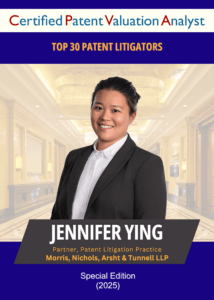
12:00 pm – Coffee Break
12:15 – Advanced Patent Litigation Strategies
This session provides high level insight into three elements of patent litigation strategies–managing the damages team, patent marking and venue selection. The following are among the issues that are likely to be addressed:
- At what point in patent litigation should experts be retained?
- Should damages experts work on reasonable royalty damages and lost profits damages (if available) simultaneously?
- How can damages determinations be used to arrive at settlements?
- How may local patent rules impact venue selection?
How important are the issuance of stays in selecting venues? - How should venue selection vary depending on the jury pool or the existence of multiple defendants?
- What constitutes appropriate patent marking? In terms of prominence, legibility and timeliness?
- How much of a product line needs to be appropriately marked?
- How much records be maintained to meet patent marking requirements?
Speaker: Robert Hart, Co-Founder, AddyHart P.C.
1:00 – Cross-Border Litigation Strategies Using Europe’s Unified Patent Court
Hear the latest developments coming out of the Unified Patent Court and learn how to build this into your toolkit for a cross-border litigation strategy. Topics will include:
- Leveraging preliminary and permanent injunctions in the UPC;
- Employing seizure proceedings in the UPC for early discovery;
- Navigating jurisdictional divides between the UPC’s various divisions and European national courts; and
- Coordinating US and UPC proceedings, including through litigation funding arrangements.
The UPC is now open for business. Incorporating the UPC into your IP strategy is now fundamental to enforcement campaigns.
Speaker: Steven C. Carlson, Partner, Robins Kaplan LLP.
2:00 – Lunch Break
2:30 – Working with Contingency Lawyers and Litigation Finance Companies
- Negotiating Contingency Fee Arrangement with Your Lawyer
- Exclusive review periods
- Firm and partner selection
- Retainers / expense sharing / splitting of proceeds
- Shifting of success fees from sequential infringers
- Handling of invalidity challenges and counterclaims
- Authority to settle
- Impact and distribution of treble damages
- Compensating law firm when business arrangements result from assertion
- Resignation and termination of law firm and potential related malpractice exposure
Speakers: Michael O’Shea, Founder, The O’Shea Firm
Michael Ciuffo, President, Tenadio Corp.
- Negotiating with Patent Litigation Finance Firms
- Legal authority to operate
- Representations and warranties
- Extent of financing
- Permissions and veto rights
- Disclosure of party of interest
- Interest and other expenses to the patentee
- Legal exposures to finance firm and patentee
3:15 – The Impact of Potential Patent Legislation on Patent Enforceability
You won’t find a more spirited presentation on pending patent legislation anywhere else. Don’t miss this opportunity to listen to a cerebral and impassioned analysis of the merits and shortcomings of changes at the Patent Trial and Appeal Board as well as the following proposed legislation:
- The RESTORE ACT
- The PERA ACT
- The PREVAIL ACT
Speaker: Paul Morinville, Executive Director, SPARK US Innovation
4:00 – Selecting Patent Damages Experts
- When should patent damages experts be retained?
- Who should select the damages experts? Patentees? Counsel?
- What criteria do patentees consider when retaining patent damages experts?
- How important is the damages experts’ technical knowledge?
- How much of a factor is the venue in selecting damages experts?
- How should damages experts’ work be supervised?
- Should there be a limit as to how frequently a patentee retains the same damages experts?
Speakers: John Jarosz, Managing Principal, Analysis Group
Tejas Shah, Senior Director – Licensing, Interdigital
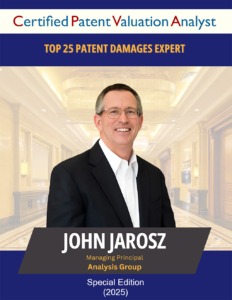
4:30 – Adjournment

Calculating Patent Damages Awards
Day 2 - May 29, 2025
How much money can patentees expect to receive when they assert their patents?
If you get the sense that calculating reasonable royalty damages is complicated, you would be right. But you would also be in for a shock when confronted with the complexity associated with calculating lost profits.
To estimate your damages awards, you also need to throw into the mix that multiple patents may be litigated in parallel in different countries, trade secrets misappropriation cases are often tried concurrently, double counting must be avoided, precedents (not always consistent) must be adhered to and caution must be applied to the precedents litigants cited and intense statistical analysis must be presented to a lay jury.
Litigating patent infringement and trade secret remedies is best left to the experts. But even the experts need to sharpen their valuation tools from time to time. That time will arrive on May 28-29, 2025 when the leading patent litigators and damages experts present breaking case law, recent trends and best practices for determining damages awards resulting from patent infringement and trade secret misappropriation.
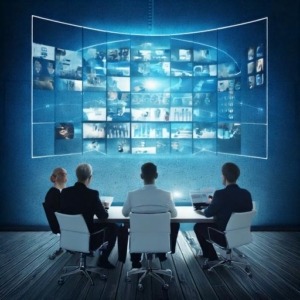
Overview of Day 2 Session
May 29, 2025 – Agenda
(All Times EST)
9:35 – Opening Remarks
9:45 – Leveraging Injunctive Relief
- Differences between preliminary and permanent inductions
- Conditions for triggering preliminary and permanent injunctions
- Criteria for removing preliminary and permanent injunctions
- Use and calculation of escrows
- Risks of triggering injunctions
- Costs of being subject to injunctions
Speakers: John Jarosz, Managing Principal, Analysis Group
Jonathan Stroud, General Counsel, United Patents

10:30 – Preparing Preliminary Damages Projections
Before you start spending significant money on a patent damages expert, it is often a worthwhile exercise to prepare a preliminary damages assessment. Who should prepare this analysis? What data will be needed? How helpful are industry reports and industry surveys? How are interest damages calculated? How are costs of capital determined?
Speakers: Dr. Yuan Tian, Vice-President, Analysis Group
David Wanetick, CEO, CPVA

11:15 – Developments Impacting Reasonable Royalty Damages
- Hedonic Regression Analysis (as per VSLI v. Intel)
- Smallest Saleable Unit v. Entire Market Value Rule
- License Comparability (as per EcoFactor v. Google)
- Litigation Awards or Settlement Agreements
- Daubert Challenges
- Trends in the Georgia Pacific Factors
- The Analytical Method
Speakers: Tom McGahee, Vice President, Analysis Group
Dr. Jon Putnam, Principal, Competition Dynamics
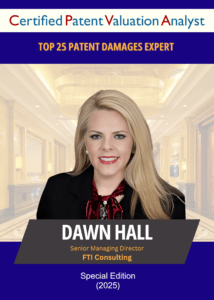
12:00 pm – Developments Impacting Lost Profits
- Panduit Factors
- Mentor GraphicsCorp., v. EVE-USA, Inc. (Duty of Apportionment)
- VirnetX, Inc. v. Cisco Sys., Inc.,
- State Industries v. Mor-Flo Industries
- WesternGeco LLC v. ION Geophysical Corp
- Exmark Manufacturing Co. v Briggs & Stratton Power Products Group (Claims and Specifications Analysis)
Speakers: DeForest McDuff, Ph.D., Managing Director, Insight Economics
Ryan Penkowski, CPA, Managing Director, Insight Economics
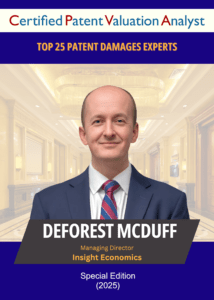
12:45 – Lunch Break
1:15 – Developments in Design Patent Damages
This session will discuss issues such as:
- Articles of manufacture
- Calculations of infringers’ total profit made on the article of manufacture
- Tests for determining articles of manufacture
- Unjust enrichment
- Apportionment
- Treble damages
Speakers: Greg Pinsonneault, CEO, LitiNomics
Dr. Ratib Ali, Economist, Competition Dynamics

2:00 – Developments in Trade Secret Misappropriation Cases
Patent litigation is often accompanied by trade secret misappropriation claims. Thus, patent lawyers and patent damages experts should have some familiarity with determining damages relating to trade secret misappropriations.
Topics of discussion include:
- Unjust enrichment
- Calculating damages based on nascent products versus established products
- Valuing misappropriated research and development
- Determining the value of faster market entry resulting from trade secret misappropriation
- Modeling disgorgement, diminution of value and reasonable royalties
Speakers: Dr. Rasmus Jorgensen, Director, NERA
Brian Segers, Managing Director, Coherent Economics
2:45 – Coffee Break

3:00 – Meditating Patent Disputes
- The pros and cons of different types of and formats for mediation
- The role of discovery, precedent and pending motions in the underlying litigation
- The ideal time(s) to mediate
- The role of the different participants in the mediation
- Unique issues when mediating SEP/FRAND disputes
- Unique challenges when mediating global disputes
- Best practices for a successful mediation
Speakers: James (“Jim”) Gale, Co-Chair – Intellectual Property Litigation, Cozen O’Connor
Barry P. Golob, Co-Chair – Intellectual Property Litigation, Cozen O’Connor
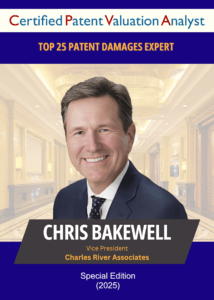
3:45 – Unique Insights into Patent Apportionment Issues
Learn how to break down business models and apportion enterprise value across companies’ intangible assets. These assets include network effects, switching costs, restrictive contracts, regulatory approvals, trade secrets, economies of scale, training manuals, public listings, proprietary test results, subscription fees, data exhaust, bottlenecks, management and workforce.
Speaker: David Wanetick, CEO, CPVA
4:30 – Adjournment

If you get the sense that calculating reasonable royalty damages is complicated, you would be right.
But you would also be in for a shock when confronted with the complexity associated with calculating lost profits.
Esteemed Faculty

Michael O’Shea
Founder – The O’Shea Firm
Michael O’Shea is the founder of The O’Shea Firm, which specializes in patent monetization. The Firm advises clients on a full contingency basis in litigating, licensing and selling their patent portfolios. Before founding the Firm, Mr. O’Shea was as a patent litigation partner in three major law firms.
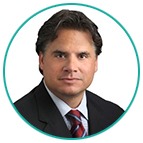
Michael Ciuffo
Founding Principal – Tenadio Corp
Michael Ciuffo has more than 28 years of experience in Structured Finance and Litigation Funding. He has managed efforts in the banking, trading and sales groups within Fixed Income at various organizations such as Deutsche Bank, Bank of America and Friedman, Billings, Ramsey & Co. Michael originated and securitized in excess of $30 billion of asset backed securities.
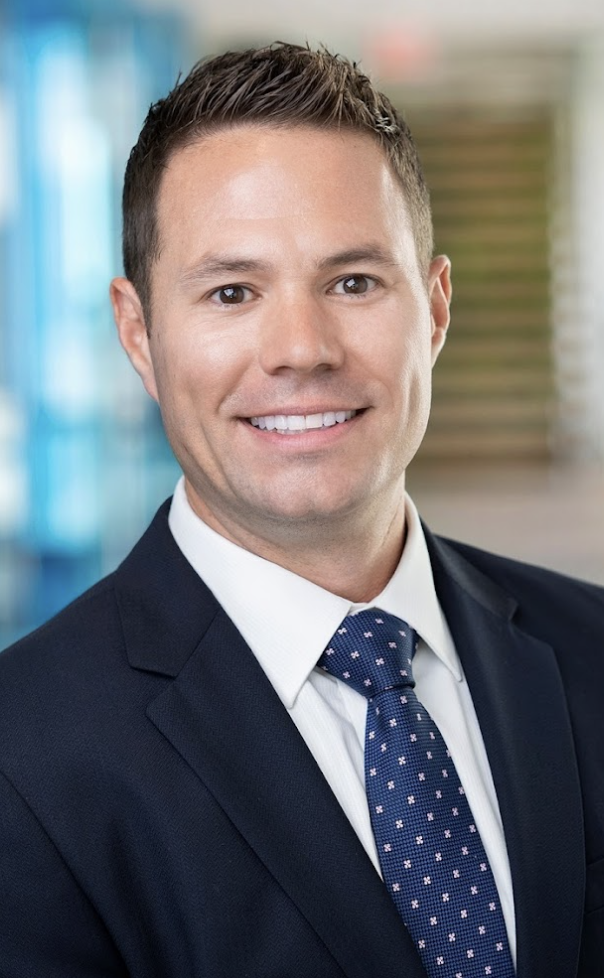
Evan Langdon
Partner / Chair – Fabricant LLP
Evan is an experienced first chair trial attorney who focuses his practice on Section 337 investigations before the ITC, intellectual property litigation in U.S. District Courts, and appeals before the Federal Circuit. Evan counsels both U.S. and foreign companies on intellectual property matters before the ITC. He leverages his mechanical engineering background and experience as a primary examiner at the United States Patent and Trademark Office to litigate disputes across a wide variety of industries.
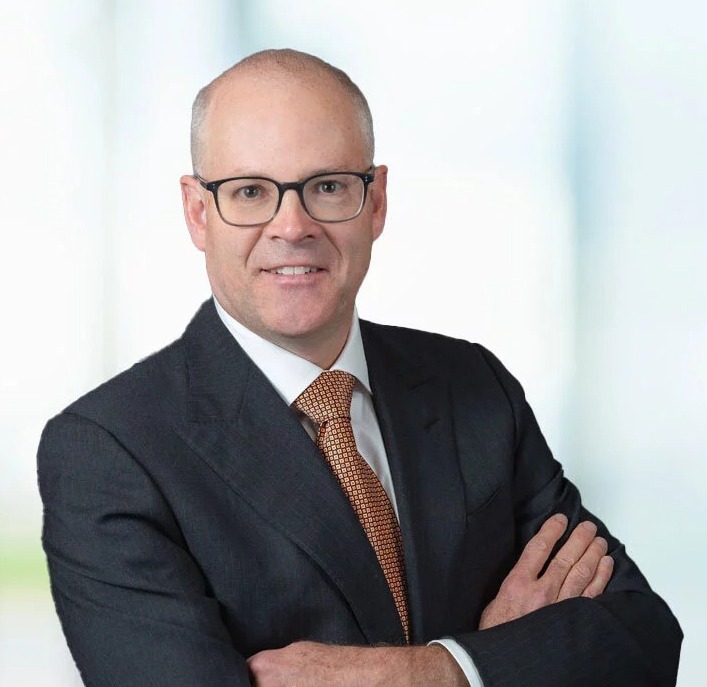
Steven C. Carlson
Partner – Robins Kaplan
Steven C. Carlson is an intellectual property litigator who draws upon national and international experience to assist clients with a wide range of legal disputes, including patent litigation, trade secret matters, and copyright disputes. Armed with a keen understanding of the technology that powers his clients’ businesses, Mr. Carlson works closely with technology companies to protect and promote their unique interests.
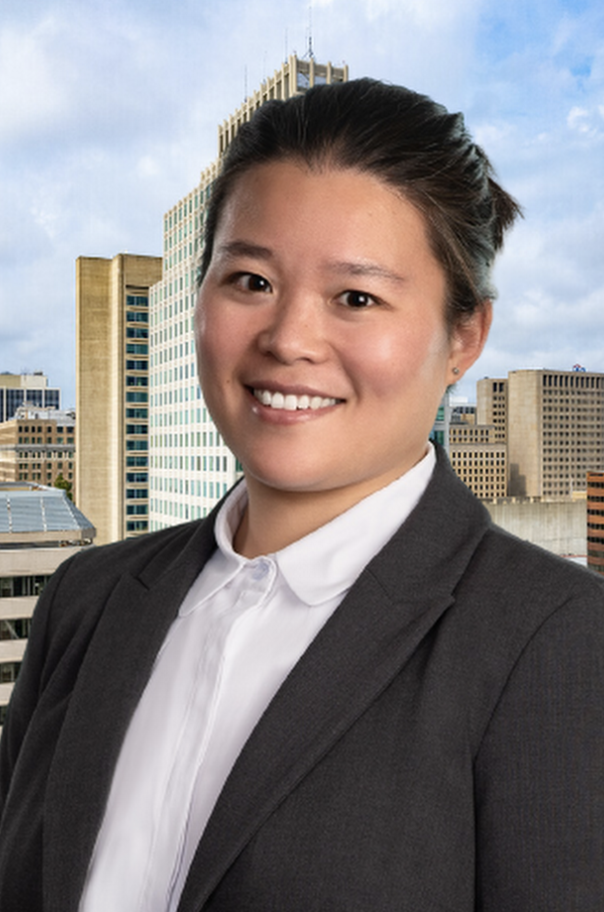
Jennifer Ying
Partner Intellectual Property Litigation – Morris Nichols
Jen Ying is a partner at Morris Nichols in Wilmington, Delaware. She is an experienced intellectual property litigator who focuses her practice on patent and trade secret disputes in federal and state court. Her experience encompasses all aspects of litigation from outset to mediation, from mediation to trial, and through appeal in both lead counsel and co-counsel roles.
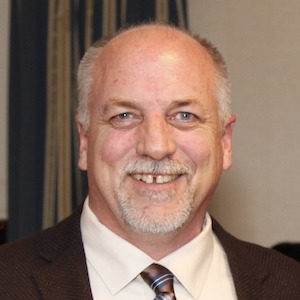
Paul Morinville
Executive Director – SPARK US Innovation
Paul Morinville is a tech inventor and entrepreneur turned citizen activist who has been walking the halls of Congress since 2013. He founded US Inventor and now SPARK. He is a strong advocate for patent rights for inventors and startups. He is an author on Innovation Gadfly, IPWatchdog and other publications, and is often quoted by the WSJ, NYT, Reuters, and other media.
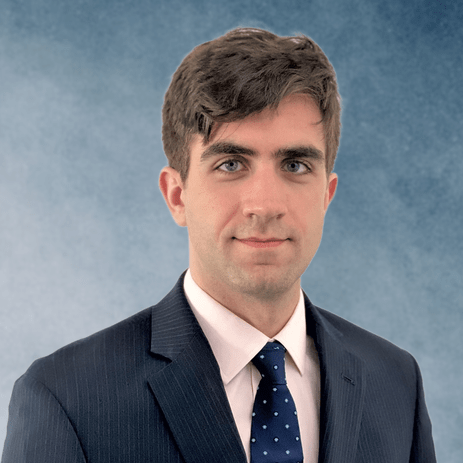
Ryan Penkowski
Managing Director – Insight Economics
Ryan Penkowski is an experienced economic consultant and CPA based in San Diego. Ryan focuses his consulting practice on intellectual property (IP) valuation and damages. He has been recognized as a leading practitioner in patent matters.
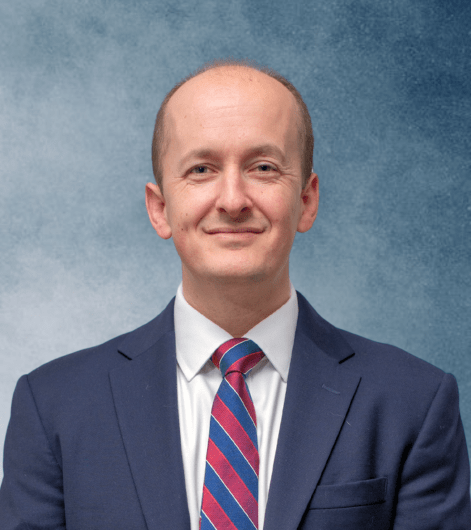
DeForest McDuff, Ph.D.
Managing Director – Insight Economics
DeForest McDuff, Ph.D. is a consultant and experienced expert witness in patent damages. He provides economic analysis relied upon by clients, courts, and government agencies to support sound economic decisions. Dr. McDuff provides economic consulting and testimony in many areas, including: Damages, IP, Unfair competition, Antitrust, and Economic analysis.
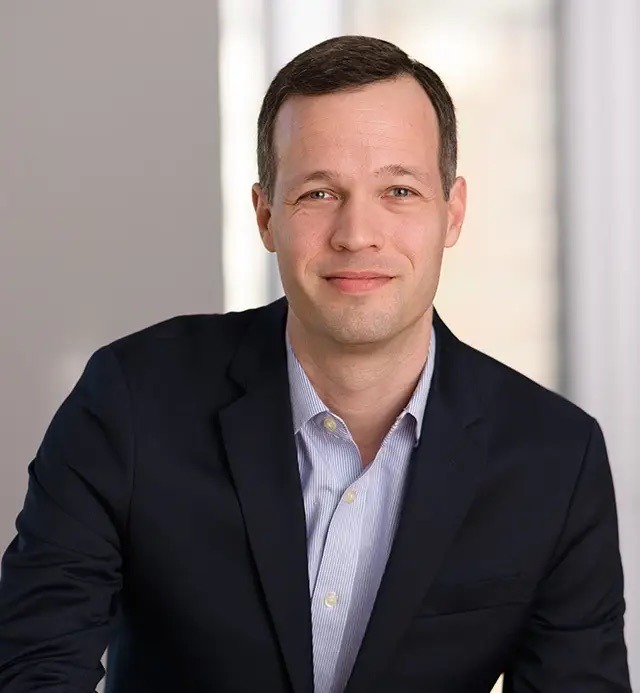
Thomas McGahee
Vice President – Analysis Group
Dr. McGahee is an economist and Vice President at Analysis Group, where he specializes in economic analysis and damages quantification. His experience includes intellectual property, antitrust, breach of contract, data privacy, and false advertising matters.

Yuan Tian
Vice President – Analysis Group
Dr. Tian is an economist who specializes in the application of microeconomics to complex disputes and business problems. He has conducted theoretical and empirical analyses of questions in intellectual property, antitrust, breach of contract, and finance matters, and evaluated reasonable royalties, lost profits, unjust enrichment, injunctive relief, and FRAND compliance.
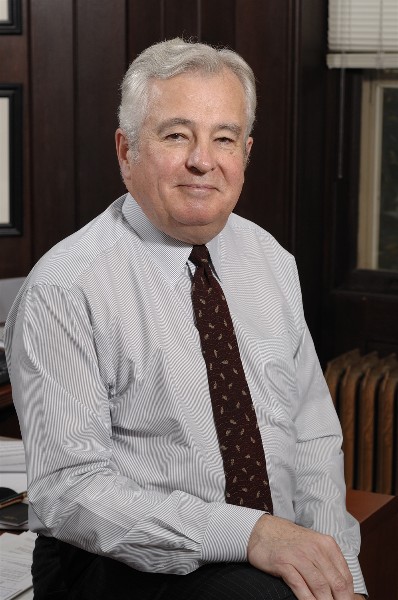
Alec Schibanoff
Vice President – IPOfferings LLC
Alec Schibanoff has been Vice President of IPOfferings LLC since 2015. He joined the company in 2010, and he is responsible for client relations and marketing at the patent brokerage firm. Mr. Schibanoff is the author of numerous patent-related trade magazine articles, including the Follow the Patents feature he writes for Electric Power & Light.

Jon Putnam
Principal – Competition Dynamics, Inc
Jon Putnam has been consulting on the economics of intellectual property for over 35 years. He holds BA, MA and PhD degrees in economics from Yale University. He has been ranked in Intellectual Asset Management’s annual list of leading economic expert witnesses since its inception in 2014.
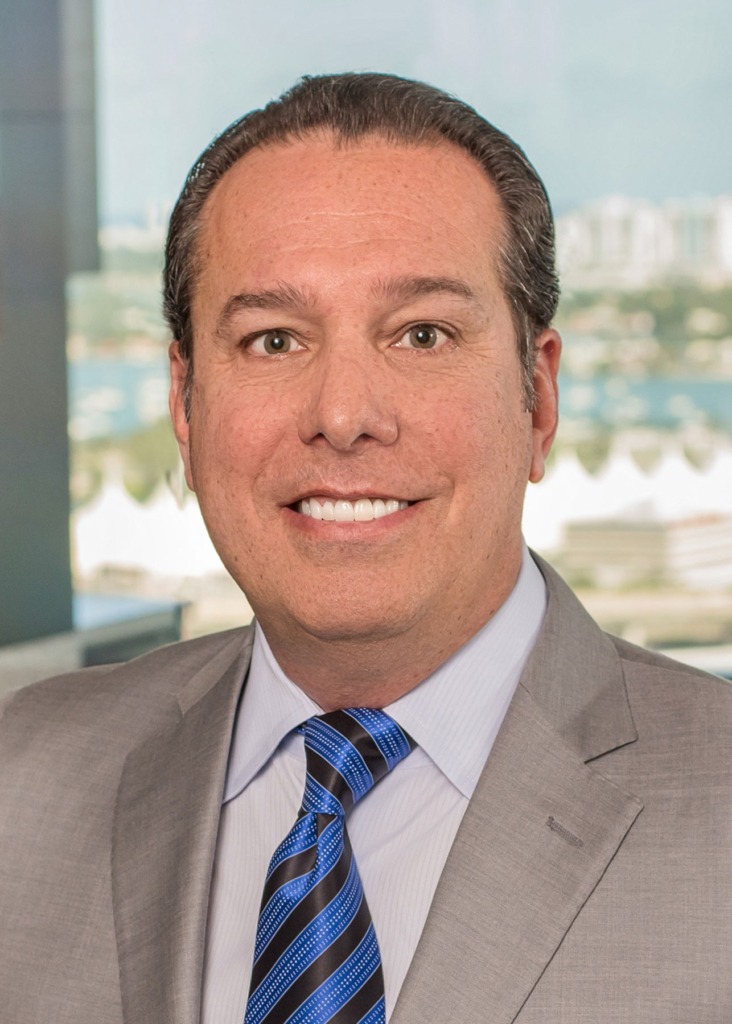
James Gale
Attorney – Cozen O’Connor
Jim Gale co-chairs Cozen O’Connor’s Intellectual Property Practice and chairs the Trade Secrets, Restrictive Covenants, and Computer Abuse Practice. He is a registered patent attorney with 42 years of experience and is Chambers Band 1 ranked in Florida, Martindale AV Preeminent© rated, Board Certified in Intellectual Property by the Florida Bar, and the former inaugural chair of Florida’s IP Board Certification Committee. Jim has handled hundreds of cases involving patents, theft of trade secrets, restrictive covenants, trademarks, unfair competition, and internet disputes. He has appeared in over 400 federal cases in more than 48 federal district and circuit courts, as well as handled hundreds of injunctions in over 35 different states around the nation.
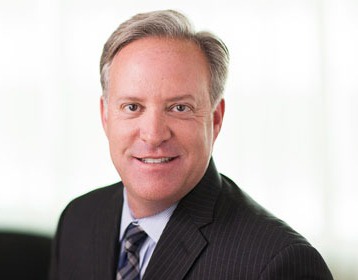
Barry P. Golob
Co-Chair – Intellectual Property Litigation
Barry is an accomplished first-chair intellectual property trial lawyer focusing on complex patent litigation as well as trade secrets and restrictive covenant matters. Barry has represented clients at all levels of litigation in various fields of innovative technology, including computer software, medical devices, office furniture, the Internet, high-performance alloys and metal matrix composites, insurance, manufacturing, LEDs, telecommunications, and consumer electronics. Using his chemistry background, Barry is also an experienced Hatch-Waxman pharmaceutical patent litigator, both for branded and generic companies.

Gregory Pinsonneault
Managing Director – CEO – LitiNomics, Inc.
Gregory Pinsonneault has delivered consulting services and expert testimony in commercial litigation matters concerning economic, financial, and business issues for more than 23 years. His practice focuses on intellectual property disputes; he has consulted on more than 150 different matters involving patents, trade secrets, trademarks, or copyrights.
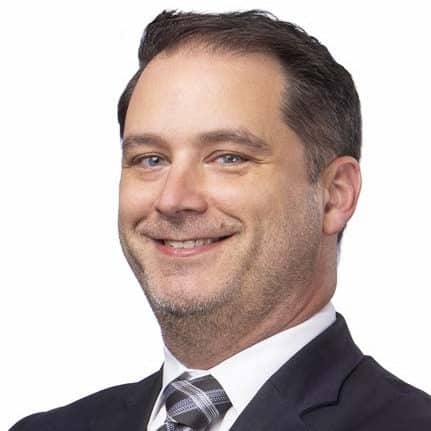
Brian Segers
Managing Director – Coherent Economics
Mr. Segers is a Managing Director at Coherent Economics. He is a testifying expert in the matters of IP damages, including patents, trade secrets, trademark, and copyright. He also has extensive experience in Hatch-Waxman pharmaceutical cases involving opinions of commercial success. In addition to his client work, Brian has dedicated time to pro bono matters involving criminal justice reform. He has provided an expert report in a constitutional class action challenge to the public defender system in Louisiana addressing the risk of constructive denial of counsel faced by Plaintiffs.
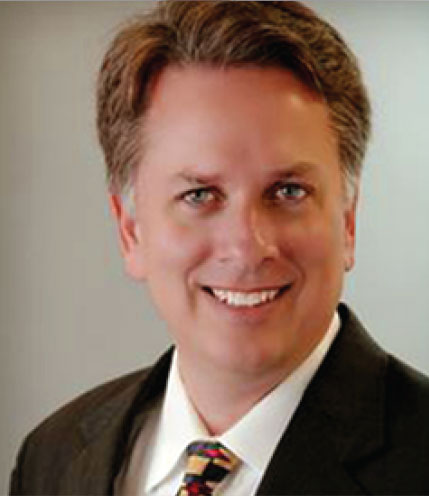
Robert P. Hart, J.D., LL.M.
Co-Founder and Partner – AddyHart, P.C.
Robert Hart, co-founder of AddyHart, P.C., has more than 30 years’ experience in private practice and as in-house counsel. He represents companies through all phases of their growth and development, and specializes in handling both routine and complex corporate and intellectual property issues. Robert’s corporate law experience includes counseling companies on entity formation, compliance and corporate governance, securities filings, transactional matters and mergers and acquisitions.
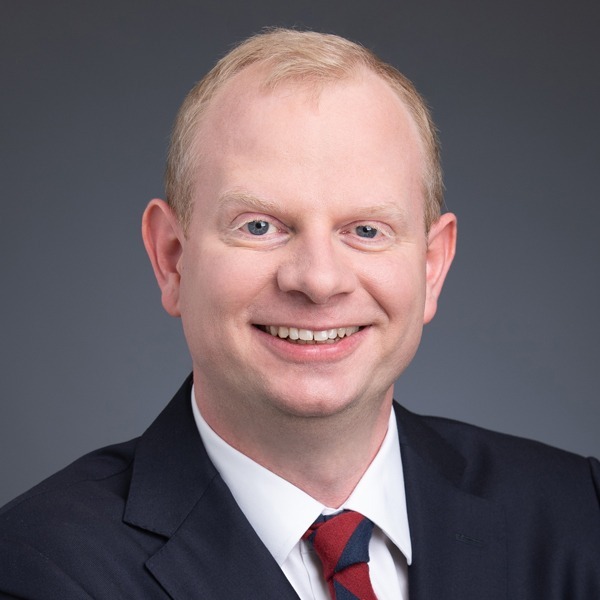
Rasmus Jørgensen, PhD
MDirector – Nera
Rasmus Jørgensen provides economic and statistical analysis to support complex litigation. His areas of focus are patent damages, commercial success, and unfair competition in a plethora of industries with a focus on life sciences such as pharmaceuticals, medical devices, and biologics.
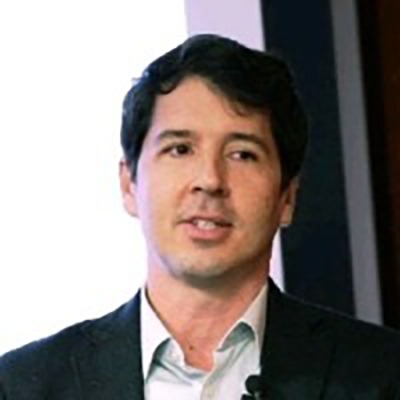
Jonathan Stroud
General Counsel – Unified Patents
Mr. Stroud manages Unified Patents’ legal and corporate work, with a focus on Patent Trial and Appeal Board (PTAB), district court, and appellate litigation, contracting, general corporate matters and settlement negotiations.
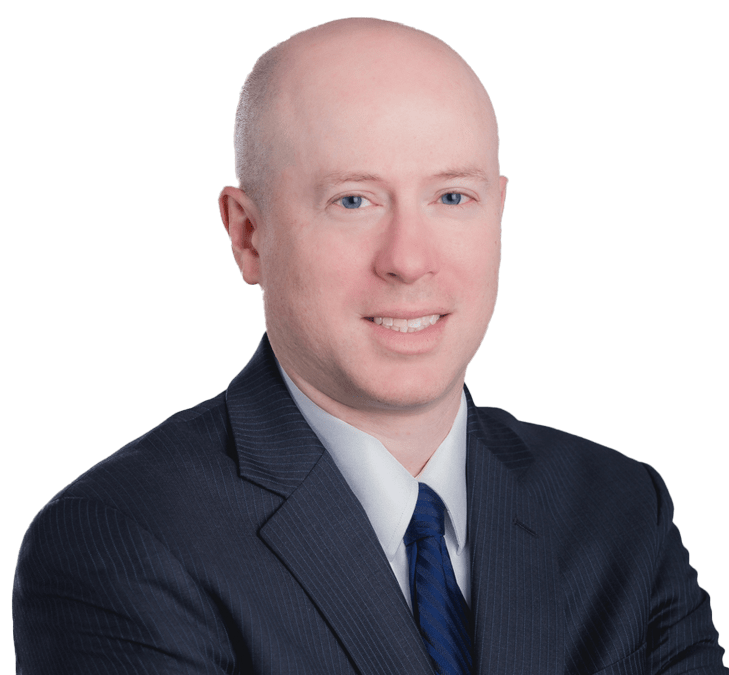
Daniel Fleisher
Associate – Hamilton, Brook, Smith & Reynolds, P.C.
Dan is an experienced patent attorney who focuses his practice on drafting and prosecuting patents in the electrical and software fields, as well as patent and other IP litigation matters. He has extensive technical knowledge in AI/machine learning, blockchain, cloud computing, graphics processing, audio processing, networking, security, and mobile communications.
Register Now and Get Immediate Access to Our Exclusive Podcast with the Honorable Kenneth Feinberg
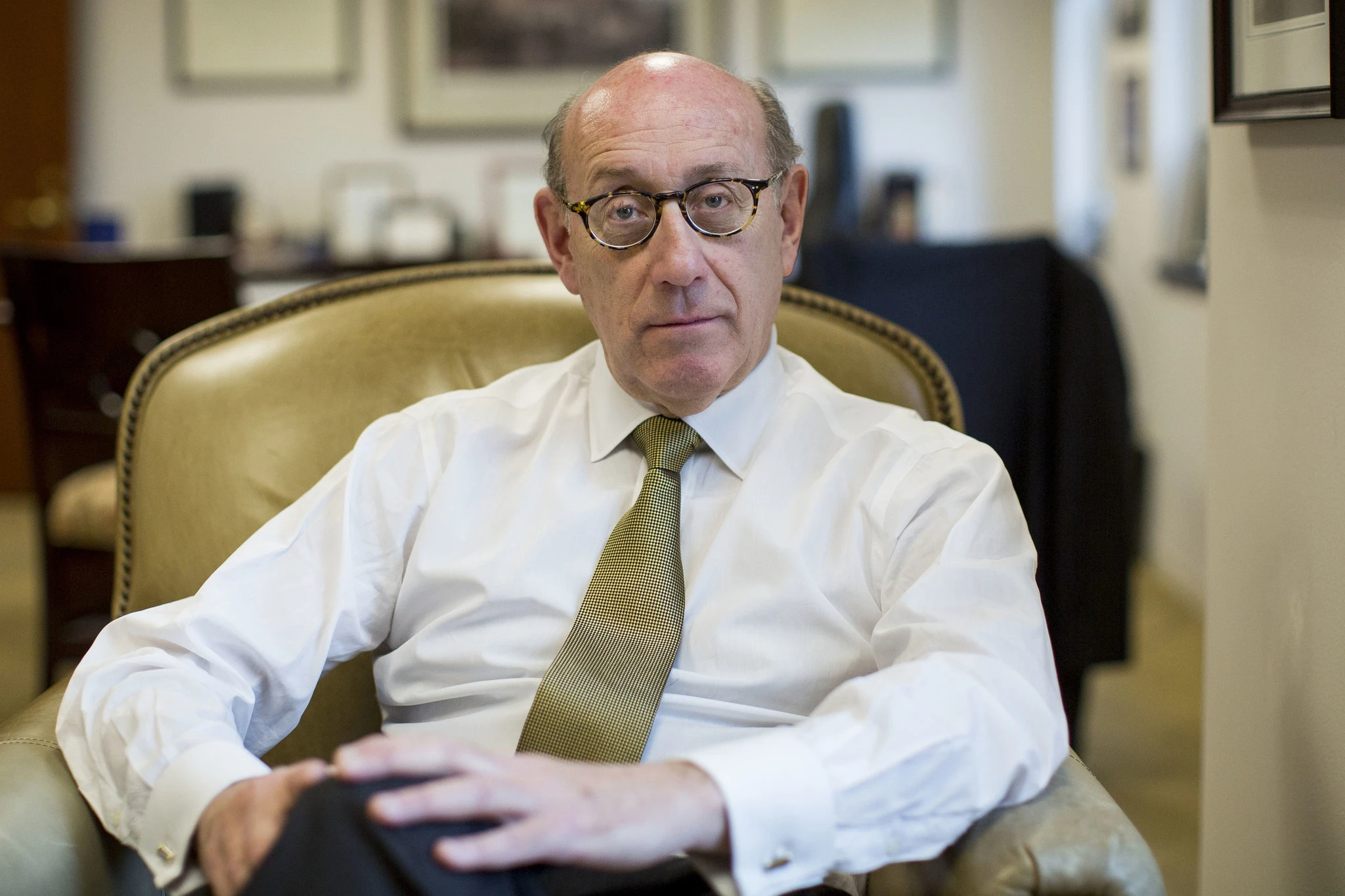
The Honorable Kenneth Feinberg
Professor Feinberg was the Special Master for:
- Agent Orange
- British Petroleum’s Oil Spill in the Gulf of Mexico
- The September 11 Victim Compensation Fund
- The Virginia Tech Shooting
- The Trouble Asset Relief Program
Listen to Professor Feinberg discuss:
- Duty to mitigate damages
- Valuing lives lost
- Objective surrogates for pain and suffering
- The importance of a fair process in compensating victims
- Victims’ sensitivity to relative payments versus absolute payments
Summit Chairmen
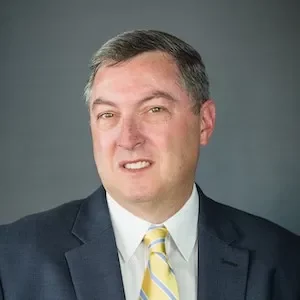
David Wanetick, CEO, Certified Patent Valuation Analyst
David Wanetick is a world-renowned authority on valuing intangible assets, particularly patents. He prepares Patent Valuation Reports that are used to facilitate transactions such as capital raises, sales of companies, sales of patent portfolios and licensing agreements. His reports are instrumental in pricing transactions worth hundreds of millions of dollars. Mr. Wanetick’s clients include Fortune 500 companies, emerging companies, private equity and venture capital funds, university technology transfer offices and government laboratories.
He developed the Certified Patent Valuation Analyst designation. Mr. Wanetick has taught this world-renowned course all over the globe including in India, Israel, Thailand, Singapore, China, Hong Kong, Malaysia, Dubai, the Philippines, France, the Netherlands, Spain, the United Kingdom, Belgium, Denmark, Germany and Canada. Attendees include IP asset managers, licensing executives, tech transfer professionals, patent lawyers, patent examiners and inventors.
Mr. Wanetick is Managing Director at Merit Investment Bank, a boutique investment bank with an expertise in selling middle market companies in a wide array of industries to operating companies and to private equity funds and their portfolio companies. Merit Investment Bank is also active in effectuating capital raises at the B round and beyond.

John C. Jarosz, Managing Principal, Analysis Group
Mr. Jarosz is an economist and director of Analysis Group’s Washington, DC office. He specializes in matters involving intellectual property (IP), commercial damages, licensing, and antitrust. His IP work focuses on evaluating lost profits, reasonable royalties, price erosion, commercial success, licensing terms, best efforts, irreparable harm, and FRAND commitments. Mr. Jarosz has significant expertise testifying in patent, trademark, copyright, and trade secret tort and contract matters. He is also experienced in both US and international arbitration, often serving as an expert witness in matters involving IP rights.
A frequent author and lecturer on the economics of IP protection, Mr. Jarosz has participated in and given presentations at various meetings of the Sedona Conference, Intellectual Property Owners Association, Licensing Executives Society, and the Association of University Technology Managers. He has published a variety of papers in professional and practitioner journals, and he has taught classes at Georgetown University Law Center, George Washington University Law School, the University of Pennsylvania Law School and Department of Economics, Columbia Business School, and the US Patent and Trademark Office. Mr. Jarosz has been recognized for many years as among the top economic experts for IP matters by Intellectual Asset Management (IAM) in the IAM Patent 1000, which identifies leading patent professionals around the globe.
Registration Information
This summit is free for all Certified Patent Valuation Analysts in good standing as well as qualified CPVA designees in training.
CPVAs can register for this program by calling Neomi Barazani at 609 919 1895 ext. 100 or by emailing her at neomi@cpva.info.
Registration fee for both days is currently just $695.
Add this summit to your training library!
Full summit on-demand video is available for an additional $200.
(Each registration is for one attendee. Sharing of webinar links is not permitted.)
CPVA Complete Course Package
The CPVA Complete Course Package consists of access to all five courses necessary to earn the Certified Patent Valuation Analyst designation. Those courses are:
- Valuation of Emerging Technologies
- Negotiating Licensing Agreements for Maximum Returns
- Calculating Damages Resulting from Patent Infringement
- Advanced Patent Valuation
- Best Practices for Monetizing Patents
Free Book: For enrolling in the Certified Patent Valuation Analyst program, we will furnish you with a COMPLEMENTARY COPY of David Wanetick’s widely acclaimed book “Business Model Validation: What Makes Business Models Work?”
- Locations of Training Programs are Provided to Registrants
- Both Days of the Two-Day Training Run from 9:00 AM to 5:00 PM
Special Offer: Receive David Wanetick’s new 800-page book, The Strategic Negotiator: A Manual for Negotiating at the Elite Level, for just $295 (regularly $795) when you register for the courses necessary to earn the Certified Patent Valuation Analyst designation.

Maximizing Returns on Patent Enforcement 2025 Registration
$395 – $895
Refund Policy
A 50% refund is available up to two weeks before the date of the event. Substitutions are free. All such requests must be in writing and sent to Neomi Barazani at neomi@cpva.info.

